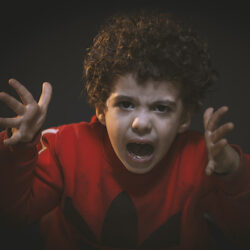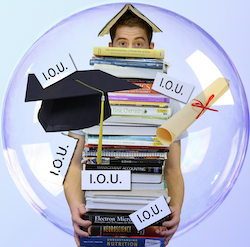My kids have always been curious about bad words. The first ones were cute, like ‘stupid’ and ‘poop.’ Then there were my accidental s-words and a-words, usually in the car. Fine, there were a few f-bombs mixed in. These were occasional. I swear. And you’ve done it too.
Some say that I have a potty mouth. I should have joined the Navy so I could actually swear like a sailor. As I realized that my kids were going to hear bad words, I decided I would approach it in two parts. First, a discussion of the absurdity that letters strung together could make a ‘bad’ word. And second, an understanding that society has informally agreed that using such words is impolite and that name-calling and hate speech are extraordinarily hurtful to people and should never be used.
Then came 2016. We saw a shift in norms around language. Like many parents, I often found myself reacting to the news of the day with a simple, “What the f*ck?” And of course, kids have magical ears when it comes to things we prefer they didn’t hear. It’s a stressful time, ok?
The last four years have been turbulent, to say the least. But don’t worry – this is not a political opinion piece. I doubt there are people anywhere on the political spectrum who want their kids to hear foul language and name-calling. What I’m concerned about is how we talk to kids about what we see and hear all around us.
The issue of cursing comes down to the old, “do as I say, not as I do” school of parenting (It’s a cousin of “because I said so” parenting). Quick and easy at the moment, but not a wonderful long term strategy. So we’re left wondering how to address the issue of swearing and name-calling, whether it comes from a peer, parent, family member, or even a president.
When kids enter adolescence, cursing can be a method of individuation – separating from parents and identifying with peers. Kids begin to use new words and can feel a sense of exhilaration by their ‘grown-up’ language. This is totally normal and not a reflection on character or upbringing. Trust me, I’ve spent enough years in middle school hallways to know. I’ve even learned some new and interesting words (don’t ask me to share).
I’ve settled on a framework for how to address the clearly contradictory messages kids get about curse words. It’s not perfect, but sometimes it’s important to teach children how to exist in gray areas. The framework consists of four parts.
Adults make mistakes
It’s true. We mess up. A lot. Owning up is incredibly important. It shows kids that everyone messes up can make bad decisions. The repair is what matters. When parents acknowledge mistakes, it humanizes us, demonstrates a maturity we hope kid emulate, and changes the incident to something positive. Just saying “whoops, let’s try that again” can be very effective in teaching kids that we can correct mistakes without major consequences.
Everyone makes choices about how they want to be
My kids are well-acquainted with a particular line I use: “You have to decide who you want to be.” Kids need space to mull things over safely. Rather than box them into a tiny closet, expand the walls to provide more room. Kids are going to curse. Some more than others, but they will all try it. Our tendency is to correct them with a knee-jerk reaction, often with discipline. Kids know full well that swearing isn’t allowed, so a verbal smackdown isn’t going to be effective in the long run.
Have no fear, there are other ways. For example, it’s amazing to watch a child’s reaction if the parent responds to a curse word with, “How does it feel to use curse words? Does it feel powerful, big, grown-up?” By framing it in those terms, there’s a de-stigmatization and a chance for the child to reflect. If the child can recognize a particular feeling, we can help her find other ways to experience the feeling.
Time and place
Here where it gets fun…I’m pleased to introduce you to the Two-Minute Amnesty game. It’s simple. Let your kids say any bad words they want (no hate speech) without repercussion for two minutes. When I do it, the kids are a little tentative at first as they consider this bizzaro world. They tentatively say a few words and usually quit before the two minutes are up (weirdos! When I was a kid, I would have gone to town and let the mother-f*cking F-bombs fly. But let’s not dwell on that). Kids learn that lightning doesn’t strike when a curse comes out. And you don’t even have to schlep to Target to shop for a game.
The amnesty game shows kids that letters strung together are not inherently ‘bad.’ But they also know that swearing like that at home, with your dad’s permission, for a set period, means that time and place matter. There’s a difference between Zooming with no pants and going to class without pants.
We get to choose our leaders
Politics. It’s impossible to avoid. There’s no red-cursing or blue-cursing. Kids hear what is said. The question is how we talk to them about it.
Kids aren’t supposed to curse. Parents aren’t supposed to curse. Teachers aren’t supposed to curse. So what do kids think when a leader swears and name-calls? I’ve heard of parents who allow cursing only when it’s about a leader or candidate they don’t like (tempting), and I’ve heard of parents who never have news on or discuss politics (frustrating). I see this as an opportunity to reinforce that we all choose who we want to be and how we want to act. If a politician wishes to name-call or swear, we can use that as a piece of information in our assessment of that person. Nobody wants their kids to swear or name-call. I see it as a person who is making a choice. We don’t have to agree with it and we get to make our own choices about how to behave.
We’re in a time when things can feel more empty than full, from our bank accounts to our social lives, the one thing we’re all full up on is challenges. But like so many things right now, this is an opportunity to encourage kids to wrestle with their values. If we use cursing as a way to connect with our kids, maybe it’ll turn into a positive. I sure as sh*t hope so.



